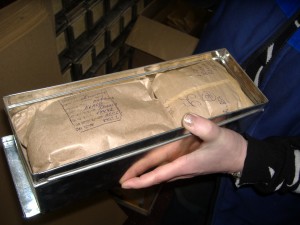- Japan’s unemployed end up farming.
- Somewhat uninformed comments about the perfection of the banana.
- “…traditional genetic crosses outperform genetically modified crops by a wide margin.”
- Alice Waters takedown.
- Brits throw money at bees.
- Red squirrel missing link found through DNA fingerprinting. Red squirrel pie, anyone? Ok ok, make it grey.
- Mexican mangroves in trouble.
- “Indigenous Peoples have contributed the least to the global problem of climate change but will almost certainly bear the greatest brunt of its impact.”
- Go go goji.
- Secretary General of the Nordic Council of Ministers and former Icelandic Prime Minister waxes lyrical about genebanks.
- So there’s a Carolina Gold Rice Foundation. No, not Golden Rice. Via.
- Help the Biodiversity Heritage Library decide on a citation format. Or not. whatever.
Where are the peanuts?
Another splendid Moche tomb has come to light: the finery buried with the Lord of Ucupe is said to be even more impressive than that of the Lord of Sipan. According to the archaeologists, “it’s unheard of to find so many precious funerary ornaments in a single Moche tomb.” Alas, no sign of the wonderful gold and silver necklace and earrings in the shape of peanuts (groundnuts) which graced the mummy of the Lord of Sipan.
I talked about this with our resident peanut expert David Williams and he said he expected that the excavators will have “found some jars full of actual peanuts as part of the all the stuff included in the burial; it’s very common in Moche tombs.” There is a theory, he explained, that peanuts were associated with death, the journey to the afterworld and reincarnation.
When planted, the peanut grows and flowers above ground like any other plant, but then it buries its fruit underground, where it germinates, returning back into the “world of the living”, growing and flowering and burying its fruit, and so on and on, for generations (or incarnations). Plus, the peanut shell is like a little coffin. Peanuts, because of their high protein and caloric value, as well as their lightweight, durable “packaging”, make great travel food, particularly for the long journey to the afterlife.
Virtual visit to VIR
Click on the picture for some impressions from my recent visit to the N.I. Vavilov Institute Research Institute for Plant Industry in St Petersburg, Russia on the occasion of a SEEDNet meeting. A veritable monument to agrobiodiversity. And don’t forget Nikolai Ivanovich has a voice.
Spring is in the air…
…and a young man’s thoughts naturally turn to gardens. Honduran gardens and their role in health. Cuban organic gardens. And via them, Around the World in 80 Gardens, a BBC documentary series that looks like it might be worth getting on DVD. And, finally, let us not forget Kew Gardens, 250 years old this year.
LATER: And there’s also an extensive discussion of the role of homegardens in providing nutrition for people living with HIV at the Solution Exchange for the Food and Nutrition Security Community in India. Thanks, Arwen.
LATER STILL: LEISA rounds up evidence of the worldwide gardening craze.
A dangerous business
Farmers are finding themselves in the front lines. In Gaza. And on the southern island of Sulu in the Philippines. And no doubt elsewhere around the world. The problems in Sulu also affect the nearby Zamboanga peninsula, home of one of the major coconut genebanks of the world, at the Philippines Coconut Authority‘s Zamboanga Research Centre.
